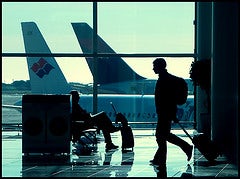
Airline travelers currently getting the go-ahead by Transportation Security Administration (TSA) staff to go through the PreCheck (or Pre√) security free of charge will soon be back in the regular line. For those unfamiliar with PreCheck, the TSA Pre√ program makes it easier and faster for travelers to go through pre-flight airport security screening. Fliers signed up with TSA Pre√ keep their belts, shoes and lightweight outerwear on and don’t need to walk through body scanner machines. They also don’t have to take their laptop out of its carry case and can leave toiletries inside their carry-on bag. These simple steps have done much to speed people through security at 118 U.S. airports.
In late July 2014, John S. Pistole, Transportation Security Administration administrator, said that because the PreCheck program has been so successful, access for random travelers being directed to TSA Pre√ will be scaled back so TSA agents can focus on paid, enrolled members. Pistoles noted about 45% of all domestic travelers are utilizing Pre√ or some other type of "trusted traveler" expedited screening. Additional screening programs include Global Entry, NEXUS, and SENTRI. Fees and eligibility requirements differ, but if you are a traveler approved for a program you can use the fast lane at security checkpoints at airports that have them. The Department of Homeland Security administers the programs and has a comparison chart for travelers to help them decide which plan suits them best.
Pistole said that on July 24, 2014 there were 2.1 million passengers screened by the TSA. Of that number, just over one million passengers underwent the expedited screening. Pistole also remarked that somewhere in the neighborhood of 440,000 travelers have paid $85.00 for a five-year membership. Over the last 12 months, many people who had not enrolled, and some that had never heard of the program were among those selected to go through an expedited lane. These random selections of low-risk travelers were driven by the TSA’s goal of having 25 percent of domestic travelers use the expedited lanes by the end of 2013. An additional reason for cutting back on non-enrolled travelers sent to the quick check lanes was that they sometimes continued through the ingrained ritual of taking their shoes, belt and jackets off and becoming further confused about keeping liquids and notebook computers in their bags. The program was at times so chaotic even TSA employees gave travelers conflicting directions.
If you’re a corporate travel or expense manager, be sure your corporate road warriors are enrolled in an expedited screening program. It will save your traveling employees unnecessary headaches and get them to their destinations safely and efficiently. Now you'll want mobile expense management software so they can complete their expense reports before their plane lands back at home.
Search
Subscribe
Latest Posts
Posts by Category
Our choice of Chrome River EXPENSE was made in part due to the very user-friendly interface, easy configurability, and the clear commitment to impactful customer service – all aspects in which Chrome River was the clear winner. While Chrome River is not as large as some of the other vendors we considered, we found that to be a benefit and our due diligence showed that it could support us as well as any large players in the space, along with a personalized level of customer care.
We are excited to be able to enforce much more stringent compliance to our expense guidelines and significantly enhance our expense reporting and analytics. By automating these processes, we will be able to free up AP time formerly spent on manual administrative tasks, and enhance the role by being much more strategic.